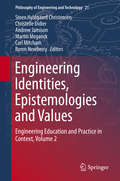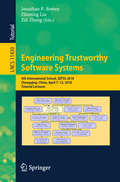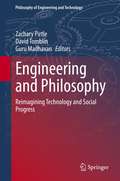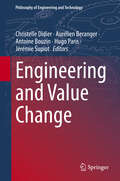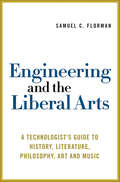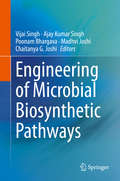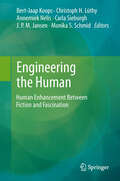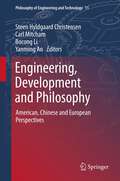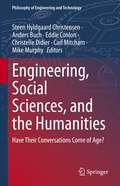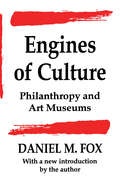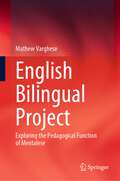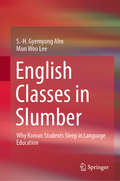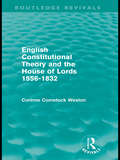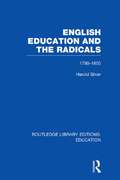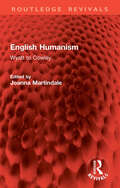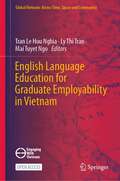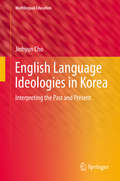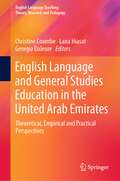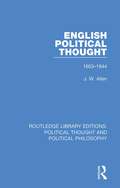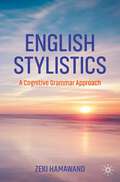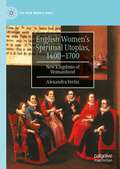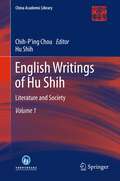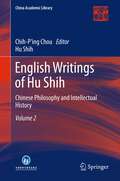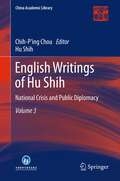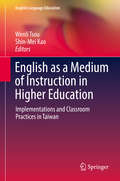- Table View
- List View
Engineering Identities, Epistemologies and Values
by Carl Mitcham Andrew Jamison Steen Hyldgaard Christensen Christelle Didier Martin Meganck Byron NewberryThis second companion volume on engineering studies considers engineering practice including contextual analyses of engineering identity, epistemologies and values. Key overlapping questions examine such issues as an engineering identity, engineering self-understandings enacted in the professional world, distinctive characters of engineering knowledge and how engineering science and engineering design interact in practice. Authors bring with them perspectives from their institutional homes in Europe, North America, Australia\ and Asia. The volume includes 24 contributions by more than 30 authors from engineering, the social sciences and the humanities. Additional issues the chapters scrutinize include prominent norms of engineering, how they interact with the values of efficiency or environmental sustainability. A concluding set of articles considers the meaning of context more generally by asking if engineers create their own contexts or are they created by contexts. Taken as a whole, this collection of original scholarly work is unique in its broad, multidisciplinary consideration of the changing character of engineering practice.
Engineering Trustworthy Software Systems: 4th International School, SETSS 2018, Chongqing, China, April 7–12, 2018, Tutorial Lectures (Lecture Notes in Computer Science #11430)
by Jonathan P. Bowen Zhiming Liu Zili ZhangThis volume contains lectures on leading-edge research in methods and tools for use in computer system engineering; at the 4th International School on Engineering Trustworthy Software Systems, SETSS 2018, held in April 2018 at Southwest University in Chongqing, China.The five chapters in this volume provide an overview of research in the frontier of theories, methods, and tools for software modelling, design, and verification. The topics covered in these chapter include Software Verification with Whiley, Learning Büchi Automata and Its Applications, Security in IoT Applications, Programming in Z3, and The Impact of Alan Turing: Formal Methods and Beyond. The volume provides a useful resource for postgraduate students, researchers, academics, and engineers in industry, who are interested in theory, methods, and tools for the development of trustworthy software.
Engineering and Philosophy: Reimagining Technology and Social Progress (Philosophy of Engineering and Technology #37)
by Guru Madhavan Zachary Pirtle David TomblinEngineers love to build “things” and have an innate sense of wanting to help society. However, these desires are often not connected or developed through reflections on the complexities of philosophy, biology, economics, politics, environment, and culture. To guide future efforts and to best bring about human flourishment and a just world, Engineering and Philosophy: Reimagining Technology and Progress brings together practitioners and scholars to inspire deeper conversations on the nature and varieties of engineering. The perspectives in this book are an act of reimagination: how does engineering serve society, and in a vital sense, how should it.
Engineering and Value Change (Philosophy of Engineering and Technology #48)
by Christelle Didier Aurélien Béranger Antoine Bouzin Hugo Paris Jérémie SupiotThis volume consists of chapters derived from the best papers submitted to the 2023 Forum on Philosophy, Engineering, and Technology (fPET) meeting that took place in April 2023 at Delft University of Technology. Topics and fields covered within the volume include applied ethics, meta-ethics, value theory, education, responsible innovation, political philosophy and value-sensitive design. The contributors present research that addresses the challenges of engineering in a changing world. This text is of interest to students and researchers working in the fields of engineering and philosophy.
Engineering and the Liberal Arts: A Technologist's Guide to History, Literature, Philosophy, Art and Music
by Samuel C. FlormanFrom the author who inspired inaugural poet Richard Blanco! Engineering and the Liberal Arts remains a fresh and provocative book, using the familiar world of technology to guide a new generation of engineers through the stimulating world of the liberal arts. Beginning with a penetrating and enlightening discussion of how exposure to the arts can enrich and reward nearly every aspect of an engineer's life, Samuel Florman—himself a decorated engineer with over fifty years' experience in the field—boldly explores the natural relationship between liberal arts and technology. Sweeping away traditional barriers separating the two fields, Florman establishes a rich and vital communication of ideas between scientist and artist.By linking the history of technology to world history, the truth of science to philosophy, utility of form to painting and sculpture, and the world of view of the engineer to literature, Florman builds a series of bridges connecting science to art. A complete survey of the arts in and of itself, this impressive volume constitutes an introduction to the infinite variety of pleasures afforded through study of the liberal arts, paving the way to a richer, fuller life for the engineer.
Engineering of Microbial Biosynthetic Pathways
by Ajay Kumar Singh Vijai Singh Poonam Bhargava Madhvi Joshi Chaitanya G. JoshiThis book provides a comprehensive overview of the basic and advanced metabolic engineering technologies used to generate natural metabolites and industrially important biomolecules. Metabolic engineering has the potential to produce large quantities of valuable biomolecules in a renewable and sustainable manner by extending or modifying biosynthetic pathways in a wide range of organisms. It has been successfully used to produce chemicals, drugs, enzymes, amino acids, antibiotics, biofuels, and industrially important pharmaceuticals. The book comprehensively reviews the various metabolites detection, extraction and biosensors and the metabolic engineering of microbial strains for the production of industrially useful enzymes, proteins, organic acids, vitamins and antibiotics, therapeutics, chemicals, and biofuels. It also discusses various genetic engineering and synthetic biology tools for metabolic engineering. In closing, the book discusses ethical, patenting and regulatory issues in the metabolic engineering of microbes. This book is a valuable source not only for beginners in metabolic engineering, but also students, researchers, biotechnology and metabolic engineering based company.
Engineering the Human
by Monika S. Schmid Carla Sieburgh Bert Jaap Koops J.P.M. Jansen Annemiek Nelis Christoph H. LüthyThe volume is collection of articles treating the topic of human improvement/enhancement from a variety of perspectives - philosophical, literary, medical, genetic, sociological, legal etc. The chapters in this volume treat not only those aspects that most immediately come to mind when one thinks of 'human enhancement', such as genetic engineering, cloning, artificial implants and artificial intelligence etc. Somewhat less obvious aspects include evolutionary perspectives in connection with the prolongation of the human lifespan, plastic surgery since its beginnings, and questions such as whether the distinction between 'natural' and 'artificial' can really be drawn at all and how it has been conceived across the ages, or what the legal implications are of recent developments and techniques. Many papers make links to the representation of these developments in popular culture, from Jules Verne through Aldous Huxley to the movie Gattaca, address the hopes and fears that come with them as well as the question how realistic these are. While all chapters are written by scientists at the international top of their respective fields, all are accessible to a non-specialist audience and eminently readable. We believe that they represent a state-of-the art overview of questions that are of interest to a large audience. The book thus targets a non-specialist audience with an interest in philosophical, sociological, scientific and legal issues involved in both traditional and recent matters concerning the desire of mankind to improve itself, the human body, the human mind and the human condition. It is unique in that it brings together all these aspects within a coherent and cohesive collection.
Engineering, Development and Philosophy
by Carl Mitcham Steen Hyldgaard Christensen Yanming An Bocong LiThis inclusive, cross-cultural study rethinks the nexus between engineering, development, and culture. It offers diverse commentary from a range of disciplinary perspectives on how the philosophies of today's cultural triumvirate--American, European and Chinese--are shaped and given nuance by the cross-fertilization of engineering and development. Scholars from the humanities and social sciences as well as engineers themselves reflect on key questions that arise in this relational context, such as how international development work affects the professional views, identities, practice and ethics of engineers. The first volume to offer a systematic and collaborative study that cuts across continental boundaries, the book delineates the kinds of skills and competences that tomorrow's engineering success stories will require, and analyzes fascinating aspects of the interplay between engineering and philosophy, such as how traditionally Chinese ways of thinking can influence modern engineering practice in the world's most populous country. China's problematic mix of engineering woes and wonders, from the high-profile crash on its high-profile rail network to its 'bird's nest' Olympic stadium, adds to the urgency for reform, while Europe's Enlightenment-informed legal frameworks are contrasted with Chinese mechanisms in their governance of the field of nanotechnology, a crucial element of future technical evolution. Fascinating and compelling in equal measure, this volume addresses one of the topics at the leading edge of humanity's quest to survive, and to thrive.
Engineering, Social Sciences, and the Humanities: Have Their Conversations Come of Age? (Philosophy of Engineering and Technology #42)
by Carl Mitcham Steen Hyldgaard Christensen Christelle Didier Mike Murphy Anders Buch Eddie ConlonThis book presents a critical examination of conversations between engineering, social sciences, and the humanities asking whether their conversations have come of age. These conversations are important because ultimately their outcome have real world consequences in engineering education and practice, and for the social and material world we inhabit. Taken together the 21 chapters provide scholarly-argued responses to the following questions.Why are these conversations important for engineering, for social sciences, and for the humanities?Are there key places in practice, in the curriculum, and in institutions where these conversations can develop best?What are the barriers to successful conversations?What proposals can be made for deepening these conversations for the future?How would we know that the conversations have come of age, and who gets to decide?The book appeals to scholarly audiences that come together through their work in engineering education and practice. The chapters of the book probes and access the meetings and conversations, and they explore new avenues for strengthening dialogues that transcend narrow disciplinary confines and divisions.“The volume offers a rich collection of descriptive resources and theoretical tools that will be useful for researchers of engineering practices, and for those aiming to reshape the engineering lifeworld through new policies. The book depicts the current state of the art of the most visible SSH contributions to shaping engineering practices, as well as a map of research gaps and policy problems that still need to be explored.” - Dr. Ir. Lavinia Marin, TU Delft, Electrical Engineering and Philosophy
Engines of Culture: Philanthropy and Art Museums
by Daniel M. FoxFirst Published in 2018. Routledge is an imprint of Taylor & Francis, an Informa company.
English Bilingual Project: Exploring the Pedagogical Function of Mentalese
by Mathew VargheseToday, English is the global lingua franca and competent English communication skills should be one of the rights of all educated individuals irrespective of any socio-cultural limits. By introducing a new method, this book focuses on helping any learner to get sufficient communication skills in English as much as in the native language. This method helps one to avoid translating from mother tongue to English. And by using the method of thinking in English, one could acquire the required English bilingual skills naturally. The method is founded on the philosophical idea of mentalese—mind language as the base language of thinking available for humans for constructing thoughts. The proposed English Bilingual Project (EBP) helps one to transfer thoughts from a structureless mentalese to the grammatical structure of any language English/Japanese/Chinese. The method described in this book works in two ways: one it helps one to intuitively understand the working of mentalese; the other is by practicing think in English with the mentalese, one could generate the bilingual brain. The main procedure for transferring thoughts from the mentalese to English is through writing one’s thoughts. This helps one to think effectively in English like one’s own mother tongue. This method works as a prime requirement model for one to generate multilingual skills. The book resourced the idea of mentalese from the classical philosophy, reflects it with the modern generative theories, links it with the studies in neuro-linguistic studies on bilingualism and the bilingual brain.
English Classes in Slumber: Why Korean Students Sleep in Language Education
by Mun Woo Lee S.-H. Gyemyong AhnThis book explains why some Korean high school students sleep during English classes in spite of the emphasized value of English in their society. It examines how this sleeping-in-class phenomenon can be understood by means of such marginalized students’ emic outlooks on themselves, the target language, their teachers, schools, and society/culture; and by means of the views of teachers who have experienced such in-class sleepers. To understand the phenomenon more holistically, it pursues a multi-disciplinary approach drawing on studies of demotivation and amotivation, psychological needs, and student experiences of schooling, as well as sociocultural theories of learning and agency and of interpersonal dynamics, among others. On the basis of a multi-modal analysis of interview data from the student and teacher participants, it theoretically interprets the phenomenon at the classroom (‘micro-’), school (‘meso-’) and society-culture (‘macro-’) levels. Taking a humanistic/existential approach to education, it subsequently presents a number of cultural actions that it advocates implementing in a situation-sensitive manner to help in-class sleepers and their educational institutions awaken from their chronic slumber. Lastly, it presents practical and theoretical implications for more humanistic pedagogy, and global studies of student disengagement, in English-as-a-foreign-language classes.
English Constitutional Theory and the House of Lords 1556-1832 (Routledge Revivals)
by Corinne WestonFirst published in 1965, this work studies the House of Lords and the various proposals for its reform, abolition or limitation of its powers which have been made in the light o f prevailing theories of the nature and characteristics of the English government. The work also contains a history of the theory of mixed government that arose in Tudor England and lasted until well after the Reform Act of 1832. This history both illuminates the position of the House of Lords and also provides perspective for the study of Democracy in the movement for parliamentary reform. One of the book's most original features is an extensive account of Charles I's Answer to the Nineteen Propostions, out of which came the startling new theory of the constitution, known as "mixed monarchy".
English Education and the Radicals: 1780-1850 (Routledge Library Editions: Education)
by Harold SilverThe radicalism of the period from the 1780s to the mid-nineteenth century represented a harnessing of knowledge in protest against injustices and oppression, a pooling of effort to transform society. In this book the author explores the main strains in working and middle-class radicalism over this crucial period, with emphasis on the educational ideas and activities of radical movements, their spokesmen and ideologies. The author stresses some of the central educational interests of radical movements through the radical organizations of the 1780s and 1790s, and early nineteenth-century political and social movements, including the utilitarians, Owenites, Chartists and Tory radicals. He discusses educational ideas and action with regard to infants and adults, basic literacy and political understanding, examines some of the forms of study, self-education and propaganda to political action. This book is a study in miniature of the processes of political and social change in a period of industrial, political and social revolution – its theme is education in its widest sense.
English Humanism: Wyatt to Cowley (Routledge Revivals)
by Joanna MartindaleThe literature of the English Renaissance demands some attention to the intellectual and educational background which produced it, in order to be seen in proper perspective. The selection in this book, originally published in 1985, both illustrate the intellectual climate of the English Renaissance and exemplify some of its characteristics, though not strictly literary products. These include education, classicism and imitation, wisdom and eloquence, history and moral philosophy, religion and vernacular scripture. Erasmus has been given a dominant place in the anthology as the main mediator of humanist ideas to England; other authors represented include Castiglione, Machiavelli, Sir Thomas Elyot, Roger Ascham and Ben Jonson. This volume charts precisely the debt of English Renaissance literature to Continental Humanism and the classical revival and is a valuable contribution to an understanding of the literature and society of the time.
English Language Education for Graduate Employability in Vietnam (Global Vietnam: Across Time, Space and Community)
by Ly Thi Tran Tran Le Huu Nghia Mai Tuyet NgoThis open access book examines the teaching and learning of English for employability in Vietnamese higher education. Its content is framed within one country to better examine the research issues within the influence of contextual factors. This book investigates how English can contribute to the development of students' employability capitals, particularly in the aspects of human capital, social capital, cultural capital, identity capital, and psychological capital. It presents employers' and employees’ perspectives of how and why English is increasingly important for career development. This book is a collection of discussions and viewpoints from teachers, students, and other stakeholders like employers, graduates, and course coordinators on current practices and their proposed improvements to prepare students for their future education, work and life. Based on empirical evidence, this book calls for repositioning English language education within the employability agenda to elevate its status and increase stakeholders' engagement. This book contributes to current debates on advancing the effectiveness of English language education in non-English speaking countries, as a response to internationalization and globalization.
English Language Ideologies in Korea
by Jinhyun ChoThis volume critically examines the phenomenon of "English fever" in South Korea from both micro- and macro-perspectives. Drawing on original research and rich illustrative examples, the book investigates two key questions: why is English so popular in Korea, and why is there such a gap between the 'dreams' and 'realities' associated with English in Korea? These questions are explored through the eyes of English-Korean translators and interpreters, who represent the professional group most intensely engaged in the zeal for English language mastery. Macro-perspectives focus on historical factors leading to the rise of English, with English-Korean translation and interpreting as a key theme. Micro-perspectives explore the dreams that individuals attach to English and the ways in which they imagine it can transform their lives, and contrast these dreams with the stark realities felt on the ground. The gaps between these dreams and realities are explored from various angles, which include commodification, gender and neoliberalism. The book thus offers fresh insights on how the phenomenon of "English fever" has been created, reproduced, and sustained from both historical and contemporary viewpoints.
English Language and General Studies Education in the United Arab Emirates: Theoretical, Empirical and Practical Perspectives (English Language Teaching: Theory, Research and Pedagogy)
by Christine Coombe Georgia Daleure Lana HiasatThis book presents an up-to-date account of current English-language English teaching and General Studies practices in the UAE. The chapters, written by leading language teacher educators, feature theoretical and empirical aspects of teaching, learning, assessment as well as related research. Throughout the book, the link between theory and practice is highlighted and exemplified. This reader-friendly book is suitable for undergraduate and graduate students, teachers, researchers and administrators of English language and general studies programs in the UAE and beyond who wish to keep abreast of recent developments in the field.
English Political Thought: 1603-1644 (Routledge Library Editions: Political Thought and Political Philosophy #1)
by J. W. AllenFirst published in 1938. A study of the political doctrines and events which led to a hardening of lines between the Royalists and the Parliamentarians. "From the March of 1604, when James I met his first Parliament to the assembly of the Long Parliament in November 1640, there was going on a conflict between irreconcilable views concerning the constitution of government in England. It was concerned with what had been and with what was and, necessarily, with what should be." By 1640 the question soon would be "how stable government could ever again be established . . . But the confusion, if it produced little else of value, produced a ferment of thought." And this ferment has had an incalculable effect on the centuries which have followed. Among the many topics discussed, on the basis of firm knowledge and with reasonableness, are the King and the nature of his claim, the parliamentary opposition and its conceptions and the possibility of compromise, the approach to Toleration, Puritanism and the Laudian Church, and the final collapse of government.
English Stylistics: A Cognitive Grammar Approach
by Zeki HamawandThis accessible textbook hinges on the central assumptions of Cognitive Linguistics and Cognitive Grammar, introducing students to the analytical tools they need to approach Stylistics, an essential area in language analysis. The author verifies the claim that alterations in style, triggered by different cognitive processes, reflect alterations in meaning, and shows how they are employed to achieve particular effects in context. The book links theory with practice, aiming both to acquaint students with the cognitive principles that account for stylistic expressions, and to provide them with the tools and techniques to conduct their own analyses. The textbook explores and explains how writers use the resources of language to create meaning, and how readers interpret texts. It will be of interest to advanced undergraduate and postgraduate students on courses in English Linguistics, as well as those working on other languages and in related areas such as Composition and Creative Writing.
English Women’s Spiritual Utopias, 1400-1700: New Kingdoms of Womanhood (The\new Middle Ages Ser.)
by Alexandra VeriniEnglish Women’s Spiritual Utopias, 1400-1700: New Kingdoms of Womanhood uncovers a tradition of women’s utopianism that extends back to medieval women’s monasticism, overturning accounts of utopia that trace its origins solely to Thomas More. As enclosed spaces in which women wielded authority that was unavailable to them in the outside world, medieval and early modern convents were self-consciously engaged in reworking pre-existing cultural heritage to project desired proto-feminist futures. The utopianism developed within the English convent percolated outwards to unenclosed women's spiritual communities such as Mary Ward's Institute of the Blessed Virgin and the Ferrar family at Little Gidding. Convent-based utopianism further acted as an unrecognized influence on the first English women’s literary utopias by authors such as Margaret Cavendish and Mary Astell. Collectively, these female communities forged a mode of utopia that drew on the past to imagine new possibilities for themselves as well as for their larger religious and political communities. Tracking utopianism from the convent to the literary page over a period of 300 years, New Kingdoms writes a new history of medieval and early modern women’s intellectual work and expands the concept of utopia itself.
English Writings of Hu Shih, Volume 1: Literature and Society
by Chih-Ping Chou Hu ShihHu Shih (1891-1962),. In the 1910s, Hu studied at Cornell University and later Columbia University, both in the United States. At Columbia, he was greatly influenced by his professor, John Dewey, and became a lifelong advocate of pragmatic evolutionary change. He received his Ph.D. in Philosophy in 1917 and returned to lecture at Peking University. Hu soon became one of the leading and most influential intellectuals during the May Fourth Movement and later the New Culture Movement. His most widely recognized achievement during this period was as a key contributor to Chinese liberalism and language reform in his advocacy for the use of written vernacular Chinese. Hu Shih was the Republic of China’s Ambassador to the United States of America (1938-1942) and later Chancellor of Peking University (1946-1948). In 1939 Hu Shih was nominated for a Nobel Prize in literature and in 1958 became president of the “Academia Sinica” in Taiwan, where he remained until his death in Nangang at the age of 71.<P> This diverse collection brings together his English essays, speeches and academic papers, as well as book reviews, all written between 1919 and 1962. English Writings of Hu Shih represents his thinking and insights on such topics as scientific methodology, liberalism and democracy, and social problems. It can also serve as a helpful resource for those who study Hu Shih and his views on ancient and modern China.<P><P> The first volume “Chinese Philosophy and Intellectual History” allows readers to trace the development of Chinese thought and see the historical methodology applied therein. The second volume “Literature and Society” mainly includes Hu Shih’s works on language reform, which owing to his advocacy for the use of written vernacular Chinese were a success in both the educational and literary fields. The third volume “National Crisis and Public Diplomacy” mainly collects Hu’s articles and speeches from his term as Ambassador of China to the U.S.A. between 1938 and 1942.
English Writings of Hu Shih, Volume 2: Chinese Philosophy and Intellectual History
by Chih-Ping Chou Hu ShihHu Shih (1891-1962),. In the 1910s, Hu studied at Cornell University and later Columbia University, both in the United States. At Columbia, he was greatly influenced by his professor, John Dewey, and became a lifelong advocate of pragmatic evolutionary change. He received his Ph.D. in Philosophy in 1917 and returned to lecture at Peking University. Hu soon became one of the leading and most influential intellectuals during the May Fourth Movement and later the New Culture Movement. His most widely recognized achievement during this period was as a key contributor to Chinese liberalism and language reform in his advocacy for the use of written vernacular Chinese. Hu Shih was the Republic of China’s Ambassador to the United States of America (1938-1942) and later Chancellor of Peking University (1946-1948). In 1939 Hu Shih was nominated for a Nobel Prize in literature and in 1958 became president of the “Academia Sinica” in Taiwan, where he remained until his death in Nangang at the age of 71.<P> This diverse collection brings together his English essays, speeches and academic papers, as well as book reviews, all written between 1919 and 1962. English Writings of Hu Shih represents his thinking and insights on such topics as scientific methodology, liberalism and democracy, and social problems. It can also serve as a helpful resource for those who study Hu Shih and his views on ancient and modern China.<P><P> The first volume “Chinese Philosophy and Intellectual History” allows readers to trace the development of Chinese thought and see the historical methodology applied therein. The second volume “Literature and Society” mainly includes Hu Shih’s works on language reform, which owing to his advocacy for the use of written vernacular Chinese were a success in both the educational and literary fields. The third volume “National Crisis and Public Diplomacy” mainly collects Hu’s articles and speeches from his term as Ambassador of China to the U.S.A. between 1938 and 1942.
English Writings of Hu Shih, Volume 3: National Crisis and Public Diplomacy
by Chih-Ping Chou Hu ShihHu Shih (1891-1962),. In the 1910s, Hu studied at Cornell University and later Columbia University, both in the United States. At Columbia, he was greatly influenced by his professor, John Dewey, and became a lifelong advocate of pragmatic evolutionary change. He received his Ph.D. in Philosophy in 1917 and returned to lecture at Peking University. Hu soon became one of the leading and most influential intellectuals during the May Fourth Movement and later the New Culture Movement. His most widely recognized achievement during this period was as a key contributor to Chinese liberalism and language reform in his advocacy for the use of written vernacular Chinese. Hu Shih was the Republic of China’s Ambassador to the United States of America (1938-1942) and later Chancellor of Peking University (1946-1948). In 1939 Hu Shih was nominated for a Nobel Prize in literature and in 1958 became president of the “Academia Sinica” in Taiwan, where he remained until his death in Nangang at the age of 71.<P> This diverse collection brings together his English essays, speeches and academic papers, as well as book reviews, all written between 1919 and 1962. English Writings of Hu Shih represents his thinking and insights on such topics as scientific methodology, liberalism and democracy, and social problems. It can also serve as a helpful resource for those who study Hu Shih and his views on ancient and modern China.<P><P> The first volume “Chinese Philosophy and Intellectual History” allows readers to trace the development of Chinese thought and see the historical methodology applied therein. The second volume “Literature and Society” mainly includes Hu Shih’s works on language reform, which owing to his advocacy for the use of written vernacular Chinese were a success in both the educational and literary fields. The third volume “National Crisis and Public Diplomacy” mainly collects Hu’s articles and speeches from his term as Ambassador of China to the U.S.A. between 1938 and 1942.
English as a Medium of Instruction in Higher Education
by Shin-Mei Kao Wenli TsouThis book presents the multiple facets of English as a Medium of Instruction (EMI) in higher education across various academic disciplines, an area that is expected to grow constantly in response to the competitive global higher education market. The studies presented were conducted in various EMI classrooms, with data collected from observing and documenting the teaching activities, and from interviewing or surveying EMI participants. Through data analysis and synthesis, cases across disciplines - from engineering, science, technology, business, social science, medical science, design and arts, to tourism and leisure service sectors - are used to illustrate the various EMI curriculum designs and classroom practices. Although the cases described are limited to Taiwanese institutions, the book bridges the gap between planning and executing EMI programs across academic domains for policy makers, administrators, content teachers, and teacher trainers throughout Asia.
